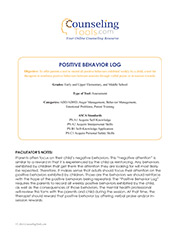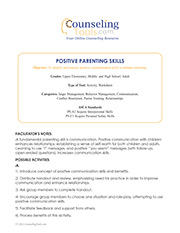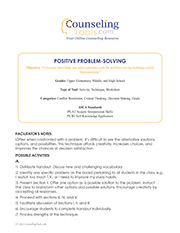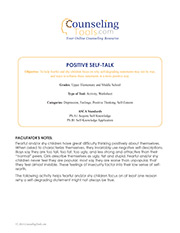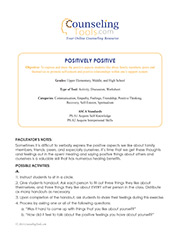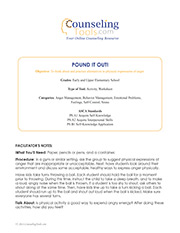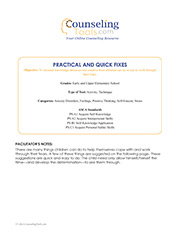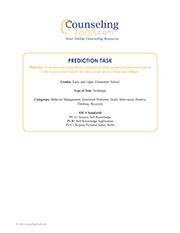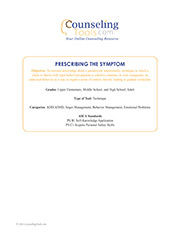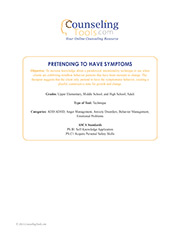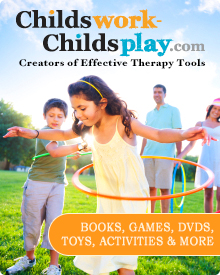-
-
TopicsADD/ADHD, Anger Management, Behavior Management, Emotional Problems, Parent Training
- Objective
To offer parents a tool to record all positive behaviors exhibited weekly by a child; a tool for therapists to reinforce positive behaviors between sessions through verbal praise or in-session rewards.
- Types of ToolsAssessment
- GradesEarly Elementary School, Middle School, Upper Elementary School
- ASCA StandardsPS:A1: Acquire Self-Knowledge, PS:A2 Acquire Interpersonal Skills, PS:B1 Self-Knowledge Application, PS:C1 Acquire Personal Safety Skills
- Number of pages2
-
-
-
TopicsAnger Management, Behavior Management, Communication, Conflict Resolution, Parent Training, Relationships
- Objective
To identify and practice positive communication skills to enhance parenting.
- Types of ToolsActivity, Worksheet
- GradesAdult, High School, Middle School, Upper Elementary School
- ASCA StandardsPS:A2 Acquire Interpersonal Skills, PS:C1 Acquire Personal Safety Skills
- Number of pages3
-
-
-
TopicsConflict Resolution, Critical Thinking, Goals
- Objective
- Types of ToolsActivity, Technique, Worksheet
- GradesHigh School, Middle School, Upper Elementary School
- ASCA StandardsPS:A2 Acquire Interpersonal Skills, PS:B1 Self-Knowledge Application
- Number of pages3
-
-
-
TopicsDepression, Feelings, Positive Thinking, Self-Esteem
- Objective
To help fearful and shy children focus on why self-degrading statements may not be true, and ways to reframe these statements in a more positive way.
- Types of ToolsActivity, Worksheet
- GradesMiddle School, Upper Elementary School
- ASCA StandardsPS:A1: Acquire Self-Knowledge, PS:B1 Self-Knowledge Application
- Number of pages2
-
-
-
TopicsCommunication, Empathy, Feelings, Positive Thinking, Recovery, Self-Esteem, Spirituality
- Objective
- Types of ToolsActivity, Discussion, Worksheet
- GradesHigh School, Middle School, Upper Elementary School
- ASCA StandardsPS:A1: Acquire Self-Knowledge, PS:A2 Acquire Interpersonal Skills
- Number of pages3
-
-
-
TopicsAnger Management, Behavior Management, Emotional Problems, Feelings, Self-Control, Stress
- Objective
To think about and practice alternatives to physical expressions of anger.
- Types of ToolsActivity, Worksheet
- GradesEarly Elementary School, Upper Elementary School
- ASCA StandardsPS:A1: Acquire Self-Knowledge, PS:A2 Acquire Interpersonal Skills, PS:B1 Self-Knowledge Application
- Number of pages3
-
-
-
TopicsAnxiety Disorders, Feelings, Positive Thinking, Self-Esteem, Stress
- Objective
To increase knowledge about several creative fixes children can try to use to work through their fears.
- Types of ToolsActivity, Technique
- GradesEarly Elementary School, Upper Elementary School
- ASCA StandardsPS:A1: Acquire Self-Knowledge, PS:A2 Acquire Interpersonal Skills, PS:B1 Self-Knowledge Application, PS:C1 Acquire Personal Safety Skills
- Number of pages2
-
-
-
TopicsBehavior Management, Emotional Problems, Goals, Motivation, Positive Thinking, Recovery
- Objective
To increase knowledge about a technique in which paradoxical intention is used as a way to give control back to the child to make positive behavioral changes.
- Types of ToolsTechnique
- GradesEarly Elementary School, Upper Elementary School
- ASCA StandardsPS:A1: Acquire Self-Knowledge, PS:B1 Self-Knowledge Application, PS:C1 Acquire Personal Safety Skills
- Number of pages2
-
-
-
TopicsADD/ADHD, Anger Management, Behavior Management, Emotional Problems
- Objective
To increase knowledge about a paradoxical intentionality technique in which a client or family with rigid behavioral patterns is asked to continue, or even exaggerate, an undesired behavior as a way to regain a sense of control, thereby leading to gradual extinction.
- Types of ToolsTechnique
- GradesAdult, High School, Middle School, Upper Elementary School
- ASCA StandardsPS:B1 Self-Knowledge Application, PS:C1 Acquire Personal Safety Skills
- Number of pages3
-
-
-
TopicsADD/ADHD, Anger Management, Anxiety Disorders, Behavior Management, Emotional Problems
- Objective
To increase knowledge about a paradoxical intentionality technique to use when clients are exhibiting mindless behavior patterns that have been resistant to change. The therapist suggests that the client only pretend to have the symptomatic behavior, creating a playful, constructive tone for growth and change.
- Types of ToolsTechnique
- GradesAdult, High School, Middle School, Upper Elementary School
- ASCA StandardsPS:B1 Self-Knowledge Application, PS:C1 Acquire Personal Safety Skills
- Number of pages3
-
- Home
- Topics
- ADD/ADHD
- Adoption
- Alcohol and Drug Prevention
- Anger Management
- Anxiety Disorders
- Asperger's Syndrome
- Assertiveness
- Autism Spectrum
- Behavior Management
- Body Image
- Bullying and Cyberbullying
- Career Exploration
- Character Education
- Classroom Issues
- Cliques
- Communication
- Types of Tools
- Grades
- ASCA Standards
- A:A1 Improve Academic Self-Concept
- A:A2 Acquire Skills for Improving Learning
- A:A3 Achieve School Success
- A:B1 Improve Learning
- A:B2 Plan to Achieve Goals
- A:C1 Relate School to Life Experiences
- C:A1 Develop Career Awareness
- C:A2 Develop Employment Readiness
- C:B1 Acquire Career Information
- C:B2 Identify Career Goals
- C:C1 Acquire Knowledge to Achieve Career Goals
- PS:A1: Acquire Self-Knowledge
- PS:A2 Acquire Interpersonal Skills
- PS:B1 Self-Knowledge Application
- PS:C1 Acquire Personal Safety Skills
- About Us
- Contact Us


 Post Forms here
Post Forms here
